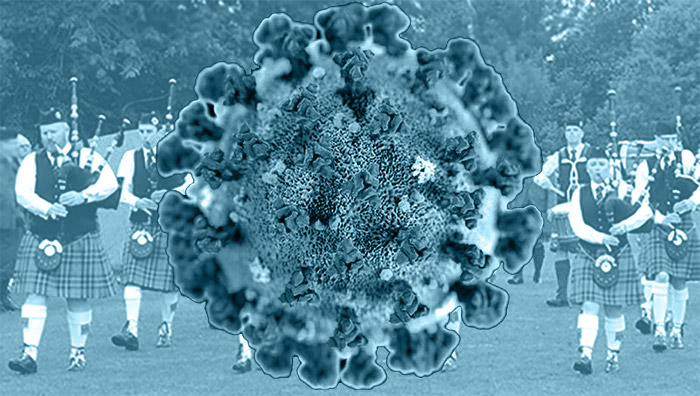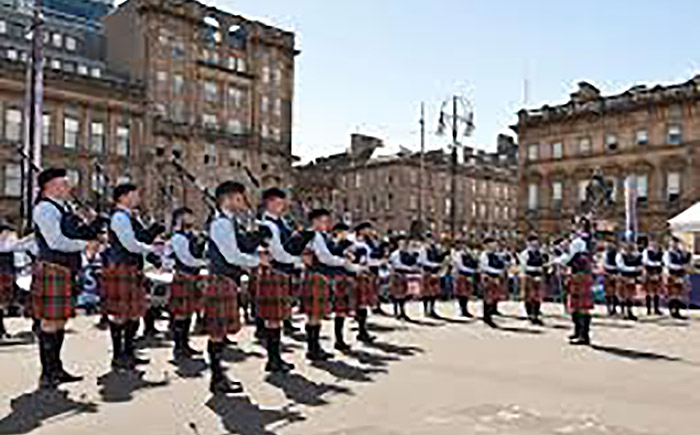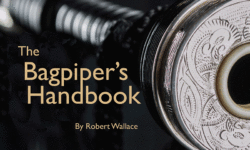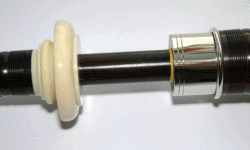Former pipe band adjudicator Alistair Aitken OBE continues his article on the difficulties facing the 2021 season…..

The World Pipe Band Championships is the pinnacle of the year for the RSPBA and its member pipe bands. Timing is possibly on the side of the Worlds in 2021 as they are not held until mid-August, being the last of the five Major Championships.
It is difficult to envisage why the event would not be supported by the City of Glasgow Council, assuming that the virus had been contained by that time and sufficient numbers of pipe bands would be prepared to attend.
The Worlds is known to be a major earner for the council and its commercial arm, Glasgow Life, as it has been estimated that the event each year brings around £20 million into the Glasgow economy, a significant amount of which will end up in the coffers of the council itself.
In normal circumstances the Scottish economy in general also benefits due to the fact that many of the pipe bands from other countries extend their stay in Scotland or make purchases of pipe band equipment etc. from Scottish suppliers.
I have often wondered if the Scottish Government is aware of all these benefits to the country. The big question, however, is whether the normal numbers of pipe bands, and particularly those from abroad, would be willing and able to participate.
Another aspect which is crucial to consider is the impact on the RSPBA itself. The RSPBA cannot survive only on the income from its band member subscriptions and the limited sponsorship it receives. It relies on the income it receives from the Major Championships, and particularly the World Championships. I am sure no-one would want to see the RSPBA ceasing to exist.
Despite its perceived faults and often unfounded criticism, the Association has been in existence since 1930 and, without it, it is highly unlikely that there would be so many pipe bands. Who knows if there would be any form of structured pipe band competition, and a great many people would not have the jobs or businesses associated with the industry. It is crucial, therefore, that the RSPBA gets back up and running again effectively in 2021.
Competition Format
Much has been made recently about the extent to which bagpipes could be a transmitter of the COVID-19 virus. Scientific advice has still to be fully established, but it seems to me that the instrument has too many holes in the chanter and drones from which air can be released that there must be a risk.
Some form of social distancing between the players in a pipe band is, therefore, inevitable and that would apply equally to pipe band competitions, the officials and adjudicators involved, and the spectators.

Much has been made recently about the possible benefits (in the light of the virus and for other reasons) of moving pipe band competitions to a half-circle or orchestra formation. Personally I have nothing against this type of formation but I wonder about the claimed benefits without looking more closely at the concept.
Much would depend on the actual formation. If, for example, the drummers were to be behind the pipers as is often the case with this formation for indoor competitions and concerts, there must be the possibility that the drummers could be at risk to some extent from the air coming from the drones in particular.
This could be even worse if the drummers were on a slightly higher level than the pipers as has also been suggested by some. A safer formation would be to have the pipers and drummers all in a single semi-circle but that could be difficult to achieve with the large numbers in the present day Grade 1 pipe bands.
It would also present a problem for the adjudicators as they would need to be a good distance from the front of the band to avoid hearing sound distortions. I remember being involved in one of the RSPBA’s trials of the half-circle formation at Bathgate Highland Games some years ago. The contest was difficult to adjudicate as the bands all formed up in different ways and the arena was too close to the spectators.
One of the bands formed up with all the players in a single half-circle. I recall that I could hear both the Pipe Major and Pipe Sergeant clearly either side of the half circle as if they were not quite integrating. Much would depend, therefore, on the player positioning.
From the adjudicator perspective the adjudicators would need to stand, or be seated, between the bands and the spectators, at a distance where they could hear the combined effect properly. I will look more closely at the judging issue in my final instalment.
- Read Mr Aitken’s first excerpt here.
-
 Bagpiper’s Handbook – Handy Maintenance Tips£10.50
Bagpiper’s Handbook – Handy Maintenance Tips£10.50 -
 Bagpipes – DN1, High Quality InstrumentPrice range: £100.00 through £1,250.00
Bagpipes – DN1, High Quality InstrumentPrice range: £100.00 through £1,250.00















